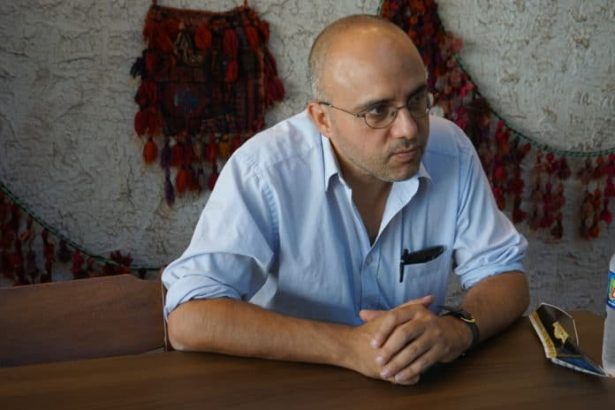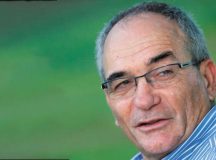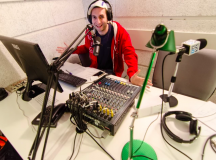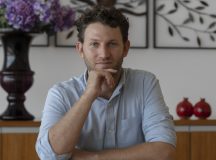Jonathan Spyer is an Israeli analyst, writer, and journalist of Middle Eastern affairs. He emigrated to Israel from London in 1991. His selection charts the musical development of Israel from the European-influenced early decades to today’s growing interest in Jewish tradition and Eastern heritages.
Monika Sex – Theme from ‘Florentin’ – Maca Afora
This song was a major hit in the 1990s, and became a theme tune for a popular TV show of the time, ‘Florentin.’ The series was about young people living in south Tel Aviv. The song reminds me of a very carefree period in my life in the mid 1990s when for a few years I and my friends lived something like in this way. Between parties, and bars, romantic attachments and temporary jobs. I remember this as a very happy time, and this song sounds like how it felt, or how I remember it at least. You can hear the influence of British bands such as the Cure, who were hugely popular in Israel, in the musical style. But the lyrics have I think a particularly Israeli, ironic and slightly melancholic but ultimately optimistic feel. I like the line about finding a place to live in south Tel Aviv, and maybe finding a subject to write about; ‘not something deep, something sweet – a love story.’ And I like the chorus, ‘you are so beautiful, it’s what you need, it’s what I want – and that’s the way it will be.’ The clip I link to is the version used for ‘Florentin’ and has some bits from the show which I think reflect the song well.
Avraham Stern – Chayalim Almonim – Anonymous Soldiers
Avraham Stern remains a somewhat controversial figure in Israel. I have always found him a fascinating, gifted and tragic figure. Certain of the policy decisions he took in the last two years of his life prevent me from being an unalloyed admirer. But his commitment to the Jewish national cause, the depth of his vision of national redemption, and his open-eyed courage, remain profoundly impressive, I think. Unlike most political figures who dabble in literature and poetry, Stern also had profound poetic gifts. This song is his most famous. It was the anthem first of the Irgun Tzvai Leumi, and then of the Lohamei Herut Yisrael, after the split. It is a gloomy and magnificent creation, outlining what in some ways is a terrifying and disturbing vision of national revival, and the price to be exacted for its success. I have many favorite lines, but I like especially the penultimate verse, in which the lyricism of other parts of the song gives way to a simple declaration of intent, with the retrospective feel of a warning about it: ‘cruel fate places obstacles before us from every side – but enemies, informers and prison houses won’t stop us.’
Shlomo Artzi – Osher Express – Happiness Express
Shlomo Artzi is considered rather mainstream among many people today, an example of a conformist and predictable Israeli style. I don’t agree with this assessment. In this case, I think, the market is right, in that the reason why he is such a huge presence in Israeli popular music is because as a songwriter and performer he is simply leagues ahead of most of the competition. I think that he has created a very particular Israeli language of popular songwriting. Israeli society is complex, of course, and it could be argued that now Artzi represents only a single side of it: namely, the European-origin and western orientated, patriotic, mainly secular, reserve-duty-doing middle classes. Well what can we do, that’s probably true, but since I am also somehow connected to that element of the population, I don’t mind. One of Artzi’s particular talents is the pithy one liner. This song is a story about growing up, from young adulthood into full maturity, and has a bittersweet tone to it. I like the line ‘I left two shirts in her room – maybe some sort of beginning will come out of it,’ and also ‘we went to sleep in our twenties on the roof, and woke up in our thirties – and pregnant.’
Dudaim – Krav Harel – The Battle of Harel
The Dudaim, Benny Amdursky and Yisrael Gorion, were a voice and acoustic guitar duo who became famous in Israel in the 1950s and continued until the 1990s. It’s possible to discern in their music the influence of Pete Seeger and the American folk revival of that period. There is also an influence of Spanish and flamenco music, as well as a distinctive Israeli and east European element. This song describes a battle in Israel’s War of Independence. The fight at Harel took place as part of the Palmach’s efforts to keep the road from the coast to Jerusalem open, and thus prevent the starving of Jewish Jerusalem. Amdursky was a veteran of this campaign. It was a desperate clash, conducted at close quarter against the Arab enemy, and with only basic weaponry.
The narrator describes the events of the battle from the point of view of a young fighter who concludes ‘ten left from the company, by the morning.’ The last part of the song lists names of the narrator’s friends who fell in the battles to keep Jerusalem open: ‘our hearts are already closed: thirty at Nebi Samuel, seventeen on the Castel, the Nevi Daniel convoy, the ‘Ginger’, Moshe, Michael, Menachem, Tzvika and Shmuel, Moti, Gad and Bezalel – but we will rise again!’ To hear the song, you need to go to 24.30 in the clip.
Shlomo Artzi – Hom Yuli August – July August Heat
A second selection from Shlomo Artzi. This song is about military service in the IDF, and I think this reflects the army I knew and served in. Not the distant ‘informers and prison houses’ of Avraham Stern, and not the early, under-equipped and desperate battles of 1948. This song depicts the army of the Intifadas and the Lebanon wars. A conscript force, containing the full gamut of people and communities to be found in the country. It depicts among other things the sometimes jarring gaps between the intensity of military experiences, and then the return to the ‘normality’, and sometimes the alienation, of modern Israeli city and civilian life. I have linked to a version with an ok translation of the lyrics for those who don’t know Hebrew. I like this part: ‘I’m writing from what I remember: I catch a taxi to Haifa, and drop into the discotheque. There’s prostitutes by the fence, and in me only a demon is burning, and I go to dance with dead soldiers in my heart.’ (the last part could also be translated as ‘with soldiers whose hearts are dead.’ Either works, I think.
Yehuda Poliker – Afar Ve’Avak – Ashes and Dust
‘Ashes and Dust’, the album recorded by Yehuda Poliker and the poet Ya’acov Gilad in 1988, was a significant moment in Israeli culture. Both Poliker and Gilad are the sons of Holocaust survivors, and the album features musical arrangements of poems by Gilad on subjects relevant to this theme. The title track, which I link to here, is a message from Gilad to his mother, Halina Birenbaum, on the occasion of her first return to Poland, the country of her birth, and where she was present during the 1939-45 period. My family here in Israel was established by one of my mum’s cousins, who alone survived the war and the destruction of their community in western Belarus. Our part of the family was already in England at the time of the war. Anyway, I find this music very affecting. Gilad advises his mother in the song ‘take a coat – you’ll be cold.’ The clip also has an ok translation of the lyrics to English.
Jane Bordo and Yisrael Gorion – Erev Shel Shoshanim – Evening of Lilies
This was one of the first hits of the Dudaim in the 1950s, and has become an Israeli ‘standard.’ It is a very sensual and romantic song. ‘An evening of lilies, we will go out to the garden. Myrrh, perfumes and incense a carpet beneath your feet.’ I have linked here to a recent version of the song by the contemporary Israeli singer Jane Bordo. Accompanying her is Yisrael Gorion, the only surviving member of the Dudaim. Benny Amdursky passed away in 1994. Gorion is much older here than in the other clip. But I like this version a lot and I think that Jane Bordo succeeds in giving the song a contemporary interpretation without losing its essence.
One of the most interesting elements taking place currently in Israeli music is the exploration of Jewish and Biblical texts, and their incorporation into popular and art songs. Another very interesting current trend is the extent to which ‘eastern’ or ‘Mizrahi’ elements are now part of the Israeli cultural mainstream, and many musicians are fusing the eastern and European elements of Israel’s Jewish heritage. This reflects the changing nature of Israeli society, I think, in the direction of greater religious observance (or at least adherence to tradition), cultural pluralism and a more eastern, Mediterranean or Middle Eastern mainstream cultural ambience. Yamma Ensemble are one of the contemporary bands who are riding both these waves in a particularly impressive way, I think. Here is a song of theirs using verses in ancient Hebrew about King David. Their singer, Talya Solan, has an appropriately commanding voice. ‘Ben Yishai (i.e. King David – son of Jesse) is alive and is living on,’ is the refrain.
Light in Babylon – Hinech Yaffa
This amazing clip shows the contemporary band Light in Babylon playing on the street in Istanbul. It has picked up 23 million views since 2013, and it isn’t difficult to see why. The singer, Elia Kamal, is an Israeli Jewish woman of Iranian descent. The other members of the band come from a variety of backgrounds. The song was written by Israeli songwriter Idan Raichel and takes lines from the Biblical Song of Solomon, or Song of Songs. The really astonishing thing here is the strength of Elia Kamal’s vocal performance, which I find to be of a matchless, heart-stopping intensity.
Once again, this interest in Jewish tradition, and a desire to explore eastern heritages in music very much reflect the current cultural mood in Israel. If one compares this music with some of my earlier selections, it is noteworthy how very ‘European’ the earlier choices are. Songs like this one reflect something very new, which is emerging from the current Israeli reality and the natural development of the society, but which relate also to something very old, namely the shared Jewish heritage and tradition of Israel’s Jewish citizens. This combination of old and new (and also, of course, just the raw, intense talent visible here) makes this element the most interesting part of the contemporary Israeli music scene, for me. ‘In my bed, already weeks, I ask for the one my soul loves, and I couldn’t find him. I searched all the streets of the city of lies, and I didn’t find him.’
Ruth Dolores Weiss – Meshirei Eretz Ahavati – From the Songs of my Beloved Land
One of the notable aspects of Israeli contemporary music is the practice of setting contemporary poems to music. Leah Goldberg was one of the greatest of Israeli poets in the pre-state period. The song here ‘From the songs of my beloved land’ is one of her most famous poems. Despite the title, the song isn’t simply a patriotic paean. Rather, it reflects the difficult and contradictory but ultimately loving nature of the narrator’s relations with Israel. ‘My homeland, land of beauty and poverty, The queen has no home, the king has no crown. There are seven holy days in the year. And hunger and toil all the rest. But for seven days the candles are blessed, and for seven days the tables are set, and for seven days, hearts are open.’ I like the slight ambivalence of all this, and I suppose it reflects my own feelings.
I have lived in Israel most of my life, but I was born and grew up until the age of 22 in London. I feel profoundly attached to Israel, its languages, its landscapes, its sights and sounds, and of course our sweet brothers who died in the fighting. At the same time, I am also in lots of ways a European, albeit a Jewish European, with the attachments and sensibilities that derive from that. I am also a person with some non-Jewish ancestry, from south Central Asia. So I like to be an insider, but also sometimes a kind of outsider-insider, looking from outside, but with warmth and affection. There are a number of well-known versions of this song, with the best known being that of Chava Alberstein. I have chosen however to link to the version by Ruth Dolores Weiss, which was used as a theme song to the series ‘Valley of Tears’.
Morin Nehedar – Ashreichem Israel – Rejoice Israel
Morin Nehedar, of Jerusalem, is an Iranian-Israeli, as is reflected in this song. It is the only one of my selection here which includes a language other than Hebrew (modern or ancient). Morin is in my view one of the most impressive presences on the current Israeli scene, and again her oeuvre consists of an exploration of Jewish tradition, and of Jewish and other songs including from Iran and the surrounding areas. But it is the purity and strength of her voice which makes the difference here. Part of the song is in Farsi, so I don’t totally understand it. But I think it is about connection to Jewish tradition, to family and to friends as sources of happiness. The beautiful and simple refrain ‘Rejoice Israel,’ sung in Hebrew, is self-explanatory.








































